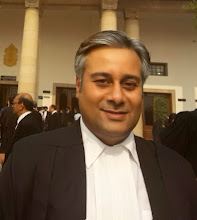ADMISSIBILITY OF EVIDENCE RELATED TO ELECTRONIC
RECORDS UNDER INFORMATION TECHNOLOGY ACT AND INDIAN EVIDENCE ACT
ELECTRONIC EVIDENCE / EVIDENCE RELATED TO
ELECTRONIC RECORDS NOT ADMISSIBLE WITHOUT CERTIFICATE UNDER SECTION 65B(4) OF
INDIAN EVIDENCE ACT.
ANY AUDIO/VIDEO RECORDING OF ANY CRIMINAL OFFENCE
GIVEN TO POLICE ON CD/DVD/PEN DRIVE, NOT ADMISSIBLE EVIDENCE PER SE.
After implementation of Information Technology Act 2000 (as amended),
amendments were made to other statues like Indian Penal code and Indian Evidence
Act, to recognize offences/ criminal acts done, using computer systems (including
electronic devices). Amendments were also introduced to Indian Evidence Act to recognize
evidence collected using computer systems. Section 65A and 65B were added to
recognize admissibility of evidence related to electronic records. Section 65A of
Indian Evidence Act reads as under:
“Section 65A: Special
provisions as to evidence relating to electronic record - The contents of
electronic records may be proved in accordance with the provisions of section
65B”
So it is evident that contents of electronic records can only be proved
in accordance to provisions of section 65B of Indian Evidence Act. In the
absence of any other law to prove contents of electronic records as admissible
evidence, this provision is complete code / law in itself, and has overriding
effect over other general provisions of admissibility of other evidence, due to
presence of Non-obstante clause in this section. Hence this special provision
related to admissibly of evidence related to electronic records, overrides
general provisions relating to admissibility of other forms of evidence in the
court of law, both in criminal and civil cases.
In this era of electronic devices, it is usual practice to record a conversation,
or make a video of any act through mobile phones, or using other spying devices
like spy camera or camera pens, to record criminal culpability of any person.
Even some popular political leaders after coming to power have advised common people,
to audio/video record conversations of bribe seeker, and further transmit the
same though email/whatsapp/Facebook or any other social media, to investigating
agencies and such investigating agencies shall take appropriate action and use
that audio/video to ascertain / prove criminal culpability of bribe seeker. It
is usual practice of investigating agencies not to comply with all the
requirements of Section 65B of Indian Evidence Act, and as a consequence of
this lapse the evidence adduced and supplied along with charge-sheet is not admissible
in the court during trial.
Under section 65B of Indian evidence Act which is a special provision
& complete law in itself, relating to admissibility of evidence related to
electronic devices; this provision has overriding effect over the general rules
of admissibility of any other non-electronic documents. Essential ingredients
of admissibility of electronic evidence under section 65B of Indian evidence
act are as under:
The conditions
referred in respect of a computer output shall be the following, namely:
(a)
the
computer output containing the information was produced by the computer during
the period over which the computer was used regularly to store or process
information for the purposes of any activities regularly carried on over that
period by the person having lawful control over the use of the computer;
(b)
during
the said period, information of the kind contained in the electronic record or
of the kind from which the information so contained is derived was regularly
fed into the computer in the ordinary course of the said activities;
(c)
throughout
the material part of the said period, the computer was operating properly or,
if not, then in any respect of any period in which it was not operating
properly or was out of operation during that part of the period, was not such
as to affect the electronic record or the accuracy of its contents; and
(d)
the
information contained in the electronic record reproduces or is derived from
such information fed into the computer in the ordinary course of the said
activities
In addition to above mentioned conditions, section 65B(4) has requirements
of a certificate to be prepared at the time of collection of evidence related
to electronic record
(a)
identifying
the electronic record containing the statement and describing the manner in which
it was produced;
(b)
giving
such particulars of any device involved in the production of that electronic
record as may be appropriate for the purpose of showing that the electronic
record was produced by a computer;
(c)
dealing
with any of the matters to which the conditions mentioned in sub-section (2)
relate,
(d)
and
purporting to be signed by a person occupying a responsible official position
in relation to the operation of the relevant device or the management of the
relevant activities (whichever is appropriate) shall be evidence of any matter
stated in the certificate; and for the purposes of this sub-section it shall be
sufficient for a matter to be stated to the best of the knowledge and belief of
the person stating it.
It is a usual practice that once any offence is recorded through any
electronic device, the same it fed over to a separate computer, the data is
copied to hard disk of that separate computer, and data is deleted from device
used to record such audio/video conversation and thereafter, that data is copied
to some CD/DVD/Removable media/Pen Drives and given to investigating agencies/police,
and such investigating agency do not collect the original device used to record
such audio/video, nor do they comply with requirements of certificate under
section 65B(4) of Indian Evidence Act. Hence in the absence of such certificate
any person accused of any offence cannot be convicted only on the basis of such
audio/video evidence arising out of such electronic record.
There has been controversy since conflicting judgments were passed by
various High Courts in interpretation of above mentioned provision of Indian
Evidence Act, which has recently been settled down by constitutional bench of Hon’ble Supreme court of India in a recent judgment
passed on 18 September, 2014. I shall discuss that judgment in my
next article.
